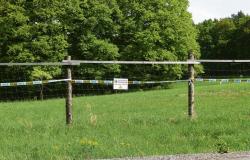Misinformation about the technology’s safety, cost or sustainability is rampant, so it’s worth checking to see if you still believe the popular but unfounded myths about green energy.
in 2023 clean energy boomed, with 50 percent of renewable energy capacity added to power systems worldwide compared to last year. more. However, in order for states to succeed in implementing this massive infrastructure deployment in the transition to green energy, it is necessary to dispel the myths that are still prevalent regarding the extraction and consumption of such energy.
Company photo/Eugenijus Šegurov
Sustainability of solar collectors
A popular but mistaken belief is about solar panels. It sometimes seems to consumers that the production, operation and subsequent disposal of solar collectors pollutes nature more than the production of traditional electricity.
“The fact that solar collectors pollute nature more is a myth. Although the manufacturing process of solar panels may require some resources and energy, this is usually only a short-term effect that is quickly compensated for during the lifetime of the panels. At the same time, the operation of the collectors also does not have a high risk of environmental pollution – for example, they do not generate any exhaust gases that are often associated with traditional electricity generation using fossil fuels.
Finally, when it comes to collector utilization, fossil fuel ash and oil sludge waste are 300-800 times and 2-5 times higher than solar module waste, respectively. In addition, much of the waste from solar panels can be recycled. Therefore, in the long-term perspective, solar collectors are significantly more environmentally friendly than traditional electricity production,” emphasizes Eugenijus Šegurova, head of sustainability solutions at Ignitis.
A way to get closer to energy independence
Another myth is that green energy does not bring tangible benefits to society. According to E. Shegurov, this is not true.
“Green energy helps reduce environmental pollution and contributes to reducing climate change, which can have a positive impact on society and the environment in the long term. In addition, this is an extremely important issue when it comes to Lithuania’s energy independence. In 2022, the European Commission launched the REPowerEU plan, which aims to protect EU citizens and businesses from energy shortages and accelerate the transition to clean energy.
Therefore, the faster the demand for green energy grows, the faster it will be possible to move to the full implementation of this plan, and such a transformation will strengthen European economic growth, security and actions to combat climate change. Therefore, it affects every person”, Eugenijus Šegurov emphasizes.
Green energy may seem expensive at first glance
One of the most common myths is that green energy is expensive. According to the Ignitis Sustainability Solutions Manager, although green energy may seem more expensive to the consumer at the moment, the price difference is almost imperceptible.
“The perception that green electricity is expensive is increasingly becoming false. Recent advances in technology have significantly reduced the cost of generating energy from renewable sources, with the cost of solar and wind power coming down significantly over the past decade. Although the monthly price of electricity for the consumer may currently remain several tens of cents higher than the price of electricity from fossil sources, in the future that difference will decrease more and more.
For example, if more consumers choose green energy, such energy producers will be able to develop even more renewable energy projects. For the end user, this means that the overall cost of electricity will fall as more green electricity is produced. On the other hand, this cannot be said about non-renewable energy sources and nuclear power plants”, says E. Šegurov.
According to the Sustainability Solutions Guide, a larger share of households opting for green energy would allow its price to fall even faster, eventually making it even cheaper: “Studies show a trend that by 2030 the prices of wind power may drop by a quarter and solar power by half.
Therefore, renewable energy is not only more stable, but it is likely to become even cheaper and more accessible. Even today, you can already see signs of price reduction – for example, if you order green electricity until April 29, you can take advantage of the promotion announced by “Ignitis”, during which such energy will be subject to a 50% discount until the end of the year. discount”.
Safety and environmental impact of wind farms
Another common opinion is related to the negative attitude towards wind farms. There are still opinions that wind turbines can harm human health or harm birds.
“There is no direct link between living near wind farms and health problems, such as sleep disorders or stress, so we cannot say that there is any health damage.” Also, the height of most wind farms is above the normal flight height of birds. However, even with this fact aside, the potential impact of wind farms on birds is relatively small.
In addition, the majority of countries adopt various solutions to help prevent such cases, for example, in the Netherlands, wind turbines are switched off during certain hours during large bird migrations. So, although there are certain doubts and fears about the safety of wind parks, the actions of various states show that the possible negative impact is much lower than thought, and the decisions taken also help to avoid negative consequences for the environment”, concludes Eugenijus Šegurov.






